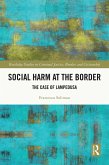Dieser Download kann aus rechtlichen Gründen nur mit Rechnungsadresse in A, B, BG, CY, CZ, D, DK, EW, E, FIN, F, GR, HR, H, IRL, I, LT, L, LR, M, NL, PL, P, R, S, SLO, SK ausgeliefert werden.
Dario Melossi, Alma Mater Professor, University of Bologna, and Distinguished Affiliated Scholar, Center for the Study of Law & Society, University of California, Berkeley
'In a fascinating ethnography of criminal courts in Italy, Eleonora Di Molfetta takes readers inside hearing room n. 59 for a close look at how justice is delivered to non-citizens. Through detailed observation, interviews with key actors, and thick description of local and global life of the city, readers get a sense of the sights and sounds of the court that together produce what Di Molfetta calls everyday justice. Everyday justice is not only about the mundane, the work flow, the problem-solving aspects of criminal courts, but captures the very profound nature of justice itself exposed in what are often relatively minor cases. Delivering Justice to Non-Citizens shows us how face to face interaction in a criminal court can become a major site of citizenship production as it reproduces and reaffirms the moral boundaries of belonging. This book will be of great interest to scholars of criminal law, migration, sociolegal studies, border criminologies, and public policy.'
Vanessa Barker, Professor of Sociology, Stockholm University
'Eleonora Di Molfetta has clearly depicted the nefarious spiral that leads migrants into the judicial system. The author's attentive gaze forces us to reflect on how judicial and law enforcement authorities' attitudes are capable of devaluing foreign defendants, making them feel mocked and isolated, on occasion at the expense of procedural safeguards. Providing an authentic portrayal of the court, this compelling and incisive book is invaluable for legal practitioners to raise the bar of professionalism and humanise court rituals.'
Mariafrancesca Abenavoli, Judge for the Preliminary Investigations at the Criminal Court of Turin, and Judicial Member of the Italian High Council of the Judiciary









